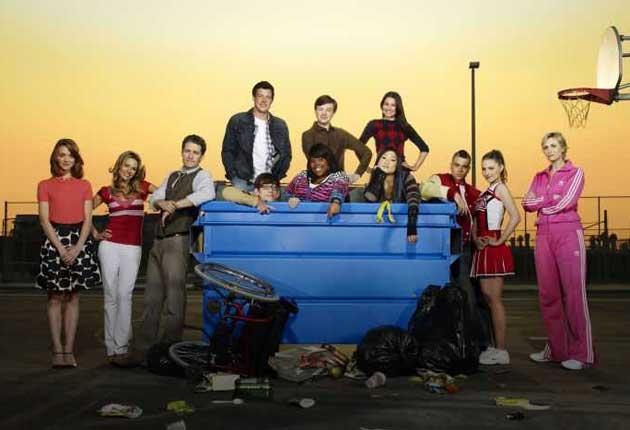Hit & Run: Join the club

From Monday evening, the gloopy romance and energetic hoofing of the High School Musical films will be distant memories for your early-teen children. They will be superseded by the lusting, cheating, lying and choral singing of Glee, the Golden Globe-nominated new school-musical comedy-drama from Rupert Murdoch's Fox channel.
The plot, such as it is, follows the attempts of charismatic Spanish teacher Will Schuester to restore the faded glories of William McKinley High School's show choir or "glee club," whose awkward squad of performers includes a quarterback, a fashion diva, a gay male-soprano footballer, a paraplegic guitarist and an Asian goth with a funny lisp.
It's a far cry from the real glee clubs of the past, which were male, English, anti-choral and unaccompanied by music. Glees were slightly jollier versions of the "catches, rounds and canon" that were all the rage in the 1650s. (Remember singing "London's Burning" in three or four-part harmony in your mixed-infants class? That's how catches survive today.) Glee enthusiasts didn't band together until The Glee Club started in 1785. Members met at a house in St Paul's Churchyard, London, owned by one Robert Smith. Gentlemen warblers formed similar societies across the nation, staging competitive glee-offs and awarding medals for outstanding glee compositions.
By the 1800s they were all the rage, but their popularity waned after 1850 as choral societies – more sober expressions of community singing – caught the public imagination. Remarkably, the spirit of glee jumped the Atlantic and student bodies formed university glee clubs in the 1850s in Cornell, Yale, Harvard, Michigan and Amherst; less organised a capella harmony singers invented barber-shop quartets.
Today, there are glee clubs all over the US – huge, formal gatherings of middle-aged men in tuxedos, barely distinguishable from Welsh male voice choirs. You can even find them in major Japanese cities, as a kind of do-it-yourself karaoke.
And over here, where it all started? You can trawl the web fruitlessly for UK glee clubs today, though you'll find the word appropriated by comedy bars in Cardiff and Birmingham. Outbreaks of British glee have lately been heard in London, however, as suburban exhibitionists, bored with book groups, are banding together to sing show tunes, with intros and harmonies, around a piano. But will the show change British youth culture? Will schoolchildren form school glee clubs, admit they've become "gleeks" and sing Kelly Clarkson's "My Life Would Suck Without You" (as they do in the show) to approving parents on Founder's Day? It would be nice to think it were possible. John Walsh
Did the CIA really have a 'triple' agent?
So, let's get this straight. After his arrest by the Jordanian authorities on suspicion of having links to al-Qa'ida, Humam Khalil Abu-Mulal was recruited by the CIA. Then, last week, Abu-Malal entered a CIA base in Afghanistan and blew himself up, killing seven agents.
As one savvy blogger notes: "Jeez, these thing's [sic] are like really so complex." The mainstream news media thought so, too; was he a double agent, or triple? Opinion was divided.
The OED was checked and denied all knowledge of the term 'triple agent'. An intelligence expert was consulted, who said that "if Abu-Malal had been working for the Jordanian government all along and Jordan was operating with a different agenda to that of its 'allies'", then he would be a 'triple agent'. But in this instance, this is not the case". In fact, Abu-Malal is certainly a double agent (one who pretends to spy for one organisation while acting on behalf of an enemy). "Unless, of course," says another expert, "he is simply an 'agent'..." Charlotte Philby
The bad habit that even eco warriors can't kick
The latest person to take a pop at the seemingly-unstoppable James Cameron juggernaut Avatar ($1bn takings and rising) is Stanton A Glantz, director of the Center for Tobacco Control Research and Education at the University of California. He was quoted in The New York Times earlier this week damning scenes in which Sigourney Weaver's character Grace Augustine is puffing on a cigarette. Glantz has criticised the movie for glamorising smoking, and claimed it was factually inaccurate. "I know a lot of environmental scientists like the Sigourney Weaver character," he said. "Not one smokes."
The officious nature of Glantz's complaint aside (Cameron has since hit back to say that Grace was not meant to be a role-model), is his claim strictly true? It doesn't seem to hold water when considering environmentalists in general. Zac Goldsmith smokes scraggy roll-ups. It's a well-known joke among environmental circles that Yvo de Boer, the current executive secretary of the United Nations Framework Convention on Climate Change, is a big smoker. Barack Obama, who won near-unanimous backing from environmentalists, has a penchant for the odd gasper. Then there are the actor-environmentalists: Leonardo DiCaprio, who fronted environmental documentary The 11th Hour, is papped puffing. Robert Redford sucked a pipe in his youth, yet has campaigned against the development of tracts of land in the US and abroad. Put that in your pipe and smoke it, Glantz. Rob Sharp
Join our commenting forum
Join thought-provoking conversations, follow other Independent readers and see their replies
Comments